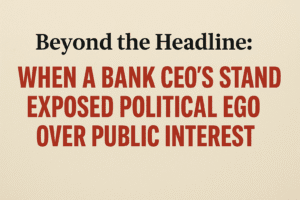Beyond the Headline: When a Bank CEO’s Stand Exposed Political Ego Over Public Interest
A Madhya Pradesh bank CEO faced suspension after refusing an MLA’s demand to cancel a clerk’s transfer, a decision the High Court ruled was blatantly biased and driven solely by the politician’s “hurt ego.” Justice Vivek Jain condemned the suspension, revealing it stemmed from illegitimate pressure, not any legitimate public grievance. The court found the MLA, also a minister, had grossly overstepped her role by intervening for a single, politically connected clerk, attempting to force the CEO to reverse a routine administrative order.
When the CEO stood firm, the MLA retaliated with unsubstantiated misconduct claims leading to his suspension. This case starkly exposes the misuse of power to punish integrity and undermine institutional independence for petty political influence, with the court serving as a crucial check against such overreach. The ruling highlights the vulnerability of officials who uphold rules against powerful interests and the corrosive impact when political ego supersedes public interest.

Beyond the Headline: When a Bank CEO’s Stand Exposed Political Ego Over Public Interest
The suspension of a bank CEO in Madhya Pradesh isn’t just bureaucratic drama – it’s a stark lesson in how political pressure can corrupt institutional integrity, and what happens when someone dares to push back.
The Core Conflict: The Chief Executive Officer (CEO) of the Central Cooperative Bank in Sidhi district transferred a clerk – a routine administrative act. This seemingly minor decision, however, triggered a powerful response. A woman MLA (also a state minister, though unnamed in the court order) contacted the CEO, reportedly “scolding” him for not consulting her about the transfer. When the CEO refused to reverse the order, a complaint was filed accusing him of using “unparliamentary language” against the MLA. Swiftly, the CEO was suspended.
The Court’s Unflinching Verdict: The Madhya Pradesh High Court, presided over by Justice Vivek Jain, saw through the facade. Its ruling was remarkably blunt:
- Undue Pressure, Not Public Interest: The court unequivocally stated this was “a case of undue pressure being exerted and not a case of general public grievance.” The MLA wasn’t acting on behalf of constituents; she was intervening for a single clerk.
- Political Muscle, Not Merit: The court observed it was “a case of a clerk using his political connections to bring about cancellation” of his transfer. The clerk leveraged his link to power.
- The Real Reason for Suspension: Hurt Ego: Justice Jain minced no words: “it is, in fact, a case of the MLA feeling ego hurt by the refusal of the petitioner to accept her demand.” The suspension was deemed “passed in exercise of excessive powers and actuated by bias and at the behest of the MLA.”
- Overstepping Authority: The court ruled the MLA had “over-reached her jurisdiction.” Her role is to bring genuine public grievances to authorities, not to dictate internal personnel decisions for personal or political reasons.
The Deeper Implications: Why This Matters to Everyone
This case transcends one bank or one politician. It highlights critical fault lines in governance:
- The Weaponization of Disciplinary Action: Suspension, a serious measure, was used not for misconduct, but as retaliation for defying an illegitimate demand. This chills administrative independence and discourages officials from acting impartially.
- The Erosion of Institutional Autonomy: Cooperative banks, vital for rural credit, must function based on financial prudence and rules, not political whims. This incident signals how easily political figures can attempt to subvert these institutions.
- The High Cost of Integrity: The CEO’s refusal, while correct, came at a significant personal and professional cost – suspension and a legal battle. It underscores the courage required to uphold principles against powerful interests.
- Misuse of Representation: An MLA’s mandate is to serve the public interest of their constituency, not to act as a fixer for individual grievances, especially those driven by personal connections. This blurs the line between representation and patronage.
- The Court as a Bulwark: The High Court’s clear-eyed assessment and strong language serve as a vital check, reaffirming that misuse of power for personal ego or political favoritism will not be legitimized.
A Lesson in Accountability: This isn’t merely about an MLA‘s bruised ego or a clerk’s transfer. It’s about whether administrative decisions will be made on merit and rules, or bent to the will of those wielding political influence. The Madhya Pradesh High Court has delivered a powerful reminder: institutions must be shielded from such overreach, and officials who stand firm in the face of illegitimate pressure deserve protection, not punishment. The true “grievance” addressed here was one of power being challenged – and the court rightly sided against it.
You must be logged in to post a comment.